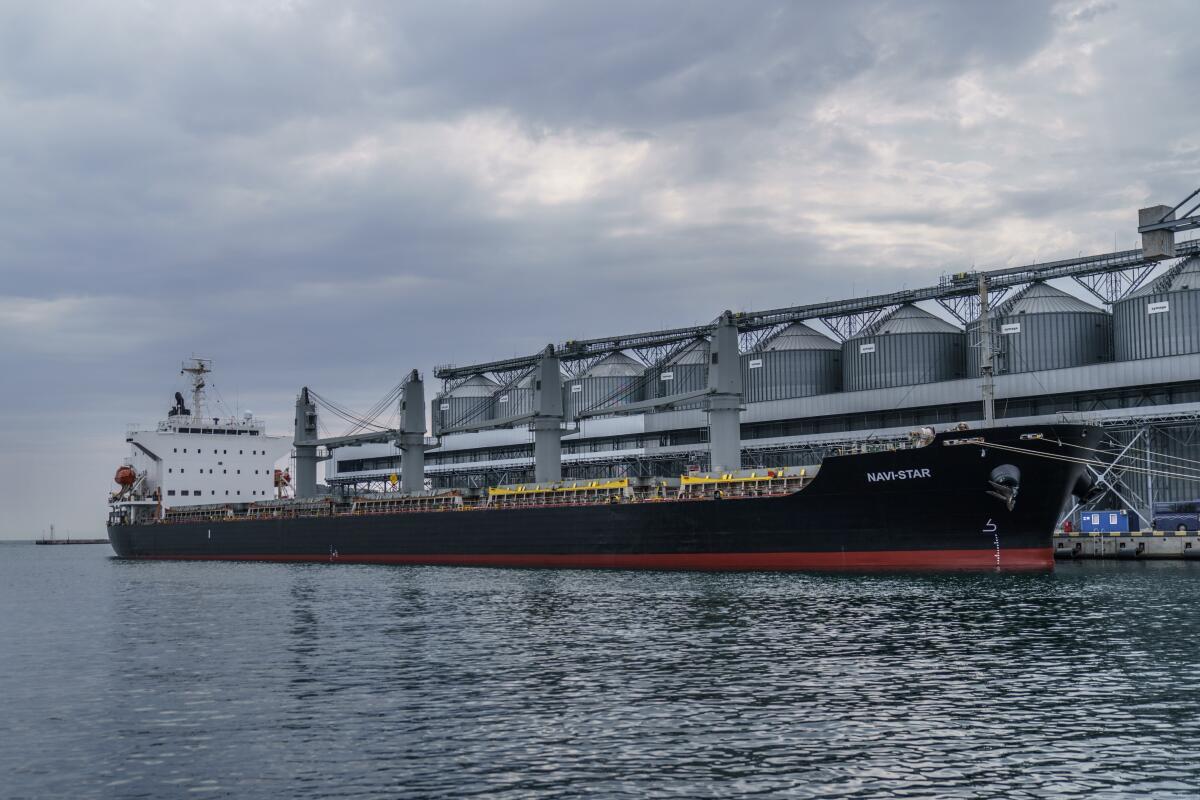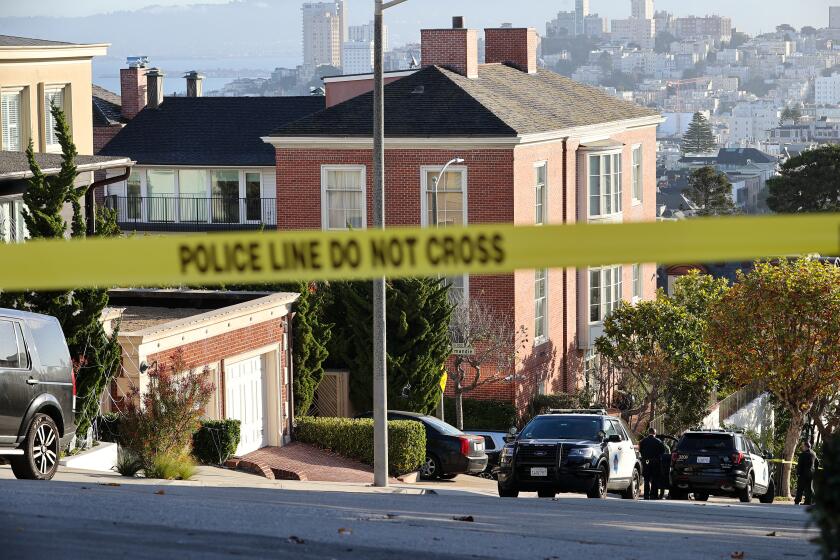Global food concerns rise as Russia halts Ukraine grain deal

- Share via
KYIV, Ukraine — Russia resumed its blockade of Ukrainian ports on Sunday, cutting off urgently needed grain exports to hungry parts of the world in what President Biden called a “really outrageous” act.
Biden warned that global hunger could increase because of Russia’s suspension of a United Nations-brokered deal to allow safe passage of ships carrying grain from Ukraine, one of the world’s breadbaskets.
“It’s really outrageous,” Biden said Saturday in Wilmington, Del. “There’s no merit to what they’re doing. The U.N. negotiated that deal, and that should be the end of it.”
Biden spoke hours after Russia announced it would immediately halt participation in the grain deal, alleging that Ukraine staged a drone attack Saturday against Russia’s Black Sea Fleet off the coast of occupied Crimea. Ukraine has denied the attack, saying Moscow mishandled its own weapons.
Ukraine’s Infrastructure Ministry reported Sunday that 218 ships involved in grain exports have been blocked — 22 loaded and stuck at ports, 95 loaded and departed from ports, and 101 awaiting inspections.
One of the blocked ships, carrying 40,000 tons of grain bound for Ethiopia under the United Nations aid program, could not leave Ukraine on Sunday as a result of Russia’s “blockage of the grain corridor,” Oleksandr Kubrakov, Ukraine’s minister of infrastructure, said on Twitter.
The Istanbul-based U.N. center coordinating the ship passages later said the Ikaria Angel was among six vessels that began moving out but hadn’t yet entered a humanitarian corridor. The center reported on plans to move and inspect other ships Monday, but it wasn’t clear whether Russia would agree.
The grain initiative has allowed more than 9 million tons of grain in 397 ships to safely leave Ukrainian ports since it was signed in July. U.N. chief António Guterres had urged Russia and Ukraine on Friday to renew the deal when it expires Nov. 19. The grain agreement has succeeded in bringing down global food prices about 15% from their peak in March, according to the U.N., which has listed Ethiopia as one of the countries most at risk for food shortages.
Ukrainian President Volodymyr Zelensky expressed outrage at Russia’s decision. Referring to the Ikaria Angel, he said in his nightly video address Sunday, “This bulk ship with wheat for the U.N. food program and other vessels with agricultural products are forced to wait, because Russia is blackmailing the world with hunger.”
Two initiatives to revive the grain deal were reported Sunday.
Turkish Defense Minister Hulusi Akar was in talks with his counterparts to “solve the problem and to continue the grain initiative,” his agency said, adding that no more grain ships would leave Ukraine but those already waiting near Istanbul would be inspected Sunday or Monday.
At the United Nations in New York, Guterres delayed a trip by a day to engage in talks aimed at ending Russia’s suspension of the grain export deal. Russia also requested a meeting Monday of the U.N. Security Council to discuss the topic.
Analysts say Russia’s withdrawal shows that it sees the grain deal as another way to pressure Ukraine.
“By leaving the deal now and putting the blame on Ukraine, it aims to slow Ukrainian attacks around the Black Sea,” said Mario Bikarski, a Economist Intelligence Unit analyst. Russia could be hoping that Ukraine’s Western allies might ask it to focus its forces elsewhere to save the grain deal, he said.
Friday’s attack on Democratic Speaker Nancy Pelosi’s husband, Paul, is the most recent example of the country’s increasing political violence.
More conflicting details emerged Sunday about the alleged attack on Russia’s Black Sea Fleet.
The City Council of Mariupol, a Ukrainian port captured by Russia on the Azov Sea, said on Telegram that Ukrainian special services had destroyed at least three Russian warships near the city of Sevastopol on the Russian-annexed Crimean Peninsula.
An advisor to Ukraine’s Interior Ministry claimed that the Russians’ “careless handling of explosives” had caused blasts on four Russian warships. Anton Gerashchenko wrote on Telegram that the vessels included a frigate, a landing ship and a ship that carried cruise missiles.
Russia’s Defense Ministry claimed Sunday that one of the drones that attacked Sevastopol could have been launched from a civilian ship carrying agricultural products from Ukraine. The ministry claimed an inspection of the wreckage showed the drones used Canadian-made navigation technology and that the launch point was the Ukrainian coast near the port of Odesa. The ministry claimed the ships that were attacked had helped secure the safety of the Black Sea grain corridor.
Independent verification of each side’s claims was not possible.
Russia’s action is facing international condemnation over the grain deal suspension. In a tweet Sunday, European Union foreign policy chief Josep Borrell urged Russia to reverse its decision.
Russia had been angling to withdraw from the deal for some time, said the Institute for the Study of War, a Washington-based think tank.
On the diplomatic front, Kremlin spokesman Dmitry Peskov said any peace talks between Russia and Ukraine should be held with Washington, which Russia views as Kyiv’s “mastermind.”
“Obviously, the deciding vote belongs to Washington … It is impossible to talk about something, for example, with Kyiv,” Peskov said on Russian state television.
Ukraine and the United States are unlikely to agree to such a demand.
On the battlefront, Russian missile attacks kept pounding key front-line hot spots in Ukraine. The Russians shelled seven Ukrainian regions over the past 24 hours, killing at least five civilians and wounding nine more, Ukraine’s presidential office said.
In the eastern Donetsk region, where the fighting is ongoing near the cities of Bakhmut and Avdiivka, eight cities and villages were shelled.
Earlier this month, Moscow intensified its missile and drone strikes on Ukraine’s power stations, waterworks and other key infrastructure, damaging 40% of Ukraine’s electric system and forcing the government to implement rolling blackouts. Kyiv’s mayor said the Ukrainian capital’s power system was operating in “emergency mode.”
In addition, in areas that Ukraine has recaptured, residents are still recovering bodies of killed civilians, Donetsk Gov. Pavlo Kyrylenko said.
“Over the past 24 hours alone, in three de-occupied towns and villages, we found abandoned bodies of Ukrainian civilians,” Kyrylenko said. “The Russians are ignoring all principles of war. Every week we discover either individual or mass graves of civilians.”
With the midterm election looming, these California voters fear U.S. democracy is beyond repair, and blame politicians for feeding the dysfunction.
Ukraine’s Interior Minister Denys Monastyrskiy also said Sunday that Russian forces were mining territories they leave behind twice as densely as during the first months of the war.
“Virtually everything in the recently de-occupied territories has been mined,” Monastyrskiy told Ukrainian television.
Power outages were reported in the occupied Ukrainian city of Enerhodar, home to the Zaporizhzhia Nuclear Power Plant, Europe’s largest. Ukrainian and Russian officials traded blame for the shelling that caused the blackout.
More to Read
Sign up for Essential California
The most important California stories and recommendations in your inbox every morning.
You may occasionally receive promotional content from the Los Angeles Times.















